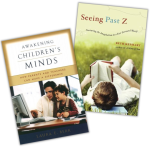When I first saw it in the Netgalley catalog, I was startled by the title It’s OK Not to Share and Other Renegade Rules for Raising Competent and Compassionate Kids by Heather Shumaker (Tarcher, 2012). Not share? Isn’t that the first thing we teach our babies during play dates? I was delighted by some of the concepts in this parenting book, not because I agreed with it all, but because it opened my mind to different ways to approach teaching my children about relationships, compassion, and dealing with the ups and downs of life.
First, I must point out the thing that did bother me about the book: Heather Shumaker based a lot of her ideas on the philosophy of her childhood preschool, which she visited and the leaders with whom she sought advice. This seemed a little unfair to the school (why didn’t they write the book?) as well as a warning sign to me. What is her authority? Her children are still young; why is she an “expert” able to write a book that I should read? These hang ups are my own, however. I frequently find myself questioning “why” when I read a parenting book. Although I will not always agree with an author of a parenting book, I find there is much to appreciate in each parent’s perspective. Such was the case with this book.
I liked Ms Shumaker’s explanations for the “renegade rules.” If we make children say “sorry,” they learn that they can say a word and go on with playing. If we teach them to stop and notice that another child is hurt or crying, they learn sincerity and compassion. Let them decide to say sorry, but do help them notice what they’ve done. Similarly, if we force a child to share a coveted swing, he may resent the parent and the other child. If we alert him to the fact that others want a turn and let him choose when to get off the swing, he may learn to be more sensitive to those around him.
Although I obviously won’t implement all the “renegade rules”1, I certainly appreciated the eye-opening look at a different way to parent. I appreciate the thoughts on how our forced compassion back-fires, and I intend to reconsider my responses to my young children in the future. In all, It’s OK Not to Share is a worth-while read for parents seeking more ideas.
P.S. I also gave The Honest Toddler by Bunmi Laditan (Scribner, 2013) a try, but the humor was not my style. If you like the blog The Honest Toddler, you should give that parenting book a try too!
Note: I received a digital review copy for review consideration from the publisher.
- I won’t let me son play with dead birds, for example, although we will learn about death another way ↩






I laughed when I saw the title of this book because I always think it’s iniquitous (for me) to make children share when they don’t want to. I don’t always want to share my stuff. Sometimes I want it to be only mine. When I visit my little cousins, I don’t make them share their toys; but then, I am not responsible for their moral development.
Jenny » Yep, that’s exactly the author’s point! I think it is a fair point, and she covers similar things in other parenting categories. I really liked the eye-opening reminder that things should have a REASON… other than trying to safe face in front of our friends, that is.